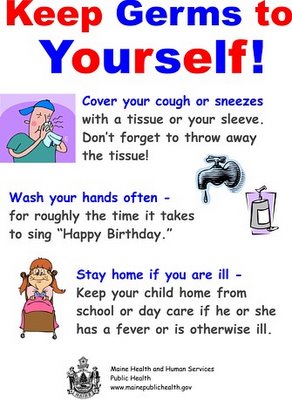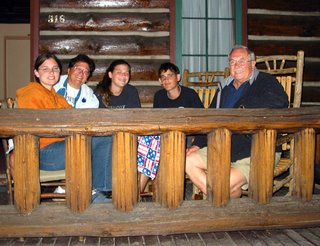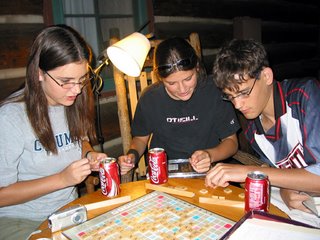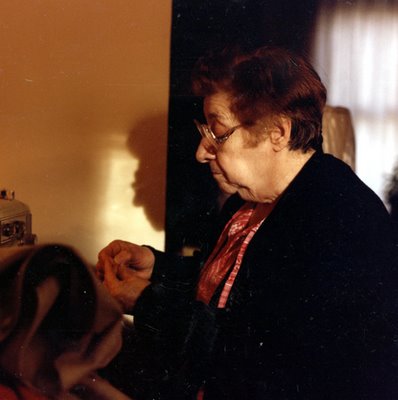
I don't think I'm a germophobe, if there is such a word. My friend Gary did a list of 6 things that were weird about himself and the 6th and final weird fact was he didn't touch bathroom door handles. I admit that grosses me out too. I will take my shirt tail out and grip the handle so I don't have to touch it. Mostly I will use my paper towel from washing my hands so I can cover the handle. I started thinking about it and checked it out on Google, here is what I found:
Dirty Door Handles
Claim: The bathroom-door handle on the public restroom is the germiest place.
False. Door handles actually have the least bacteria of any surface in public restrooms, according to a test by Chuck Gerba, PhD, a professor of environmental microbiology at the University of Arizona in Tucson. 68 percent of people wash their hands before leaving the restroom.
Unclean Office Objects
Claim: Your office desk is way dirtier than a toilet bowl.
True. The average desktop has 400 times more bacteria than a toilet bowl, simply because people usually don't clean their desks on a regular basis, The germiest object: the phone. Viruses such as the flu can survive for two or three days on desktops, phones, and computer keyboards. (By the way, the door handle on the microwave in the office kitchen is also a very germy place. So be sure to wash your hands after heating up your lunch.)
Filthy Floors
Claim: You can get plantar warts and athlete's foot from walking barefoot on the gym floor.
True. Both plantar warts, caused by a virus that produces flat gray or brown bumps on the soles of the feet, and athlete's foot, a fungus that causes flaking and itching between the toes and on the soles of the feet, are often contracted from walking barefoot in the locker room. Always walk around the locker room in flip-flops, and never go barefoot in any public place.
Scuzzy Sponges
Claim: Washing a sponge in the dishwasher removes germs.
True. Running sponges in the dishwasher with detergent gets rid of a lot of germs, but putting the sponge in the microwave for a minute will zap even more, since it gets much hotter in there. Whatever method you use, be sure to do it every other day. It's also wise to rinse sponges well and keep them out of the sink so they can dry out between uses. "Drying kills a lot of germs." You should also change sponges frequently, definitely toss them after three weeks.
Unsanitary Kitchen Sinks
Claim: You need to clean the kitchen sink every day with bleach.
False. Kitchen sinks are brimming with germs, but a daily rinse with soap and water prevents bacteria buildup. If you've been handling raw meat or poultry, however, be sure to wash your hands, then clean your sink with hot soapy water before you touch anything else or place another food or kitchen tool (knife, strainer) in the sink. Also, every now and then pour some diluted bleach down the drain or garbage disposal. Bacteria from the sink can spread throughout the kitchen, including faucets and door handles, if you don't wash your hands after you prepare a meal. If you clean raw chicken in the sink, then touch the faucets, or a sponge drops in there before you wash your hands or the sink, you've potentially contaminated the sponge and the faucet.

Bunking with Bacteria
Claim: If you've had the same pillow for years, you're bunking with billions of bacteria.
True. But don't lose any sleep over it. The organisms found on pillows are normally harmless bacteria that live on your skin. Pillows themselves aren't breeding grounds for germs. Wash pillowcases once a week and pillows regularly (most can go in the washing machine).
Bedbug Elimination
Claim: You must wash your sheets every week in hot water or you'll get bedbugs.
False. Washing sheets will get rid of dust mites, microscopic bugs that live on dead skin cells and other allergens. People often confuse dust mites with bedbugs, which are parasites that feed solely on animal blood. They're spread mainly through luggage (if a hotel room you're staying in has them, for example) and clothing.
Dust mites, on the other hand, are harmful only to those who are allergic to the protein they produce. Otherwise, they're helpful, because they actually remove the dead skin cells that you continuously shed.
Toothbrush Trouble
Claim: Every time you flush the toilet, your toothbrush gets sprayed with bacteria.
Gross but true. Microorganisms are ejected when you flush the toilet and land all over the bathroom, even if you close the lid. But you probably won't get sick from this. "When the toothbrush dries, most of the organisms will die anyway." Just keep your toothbrush as far away from the toilet as possible.
Bathroom Bacteria Buildup
Claim: Wash your shower curtain, tiles, and tub once a week to prevent an overgrowth of bacteria.
True. Doing a thorough cleaning once a week prevents the growth of mildew, a fungus that feeds on body oils and soap scum and can cause allergy symptoms including headaches and coughing.
Laundry Mildew
Claim: Letting wet clothes sit in the washer allows mildew to form.
True. But they'd usually have to sit for 24 hours. If your clothes have a funky odor, you'll have to run the washing machine again. Laundry is a significant source of organisms, says Gerba, who swabbed 100 washing machines and found that 44 percent of them contained fecal bacteria. Drying will kill e. coli, but salmonella and viruses can remain. The risk of getting sick is small if you're healthy, but if someone in your home is ill, you may want to wash their clothes separately and then do a bleach cycle. You could transfer a virus by touching the clothes and then rubbing your eyes or nose. It's also a good idea to wash your hands after handling dirty laundry.
Contaminated Makeup
Claim: Your makeup is a breeding ground for bacteria.
True. "Any bacteria on your hands or face contaminates the makeup when they come in contact." Two possible problems can result: pimples, which are caused by bacteria trapped inside pores; and pinkeye, a bacterial infection caused by staphylococcus. And never share makeup; you can easily transfer infections this way.
Dirty Money
Claim: Money is by far the germiest stuff around.
False. In general, because dollar bills are dry, they don't give bacteria a chance to multiply to levels that would make you sick. Plus, the metal in coins actually acts as an antibacterial agent. You certainly don't have to run to the bathroom and wash up after each transaction -- unless you sit down to eat afterward, you should always wash your hands before eating anyway!
Should You Use Antibacterial Products?
Not unless someone in the house is sick. Alcohol- and bleach-based products work best at killing germs without promoting the growth of dangerous "super bugs."
So my friends, this is a list that I discovered and edited. Don't get crazy about it, just be aware of the facts. And
WASH YOUR HANDS!
 I don’t like to write about politics, everyone has their own opinion. I am making an exception today. After I watched “Face the Nation” today I felt like I had to say something. Bob Schieffer had Fuad Siniora, Prime Minister of Lebanon on via satellite from Beirut and Deputy Prime Minister of Israel, Shimon Peres, who was in New York. The most telling statement was from Peres, he said Israel has no quarrel with Lebanon. They do not want their territory or to influence their politics. He stated that Hezbollah has about 6000 to 8000 men, the Lebanese army numbers 80,000. If the Lebanese government wants a cease-fire, they must order the army to stop Hezbollah forces that are firing over 200 rockets a day into Israel. Prime Minister Siniora has it within his power to stop this terrible fighting. He refused to acknowledge Bob Schieffer’s question about why he wasn’t doing this.
I don’t like to write about politics, everyone has their own opinion. I am making an exception today. After I watched “Face the Nation” today I felt like I had to say something. Bob Schieffer had Fuad Siniora, Prime Minister of Lebanon on via satellite from Beirut and Deputy Prime Minister of Israel, Shimon Peres, who was in New York. The most telling statement was from Peres, he said Israel has no quarrel with Lebanon. They do not want their territory or to influence their politics. He stated that Hezbollah has about 6000 to 8000 men, the Lebanese army numbers 80,000. If the Lebanese government wants a cease-fire, they must order the army to stop Hezbollah forces that are firing over 200 rockets a day into Israel. Prime Minister Siniora has it within his power to stop this terrible fighting. He refused to acknowledge Bob Schieffer’s question about why he wasn’t doing this. I think peace will come eventually because nothing stays the same. But the loss of innocents makes me want to do something, I just don’t know how or what. Israel is an awesome place, it's history is in our psyche.
I think peace will come eventually because nothing stays the same. But the loss of innocents makes me want to do something, I just don’t know how or what. Israel is an awesome place, it's history is in our psyche. 









